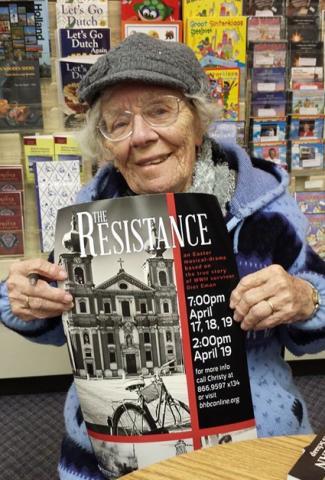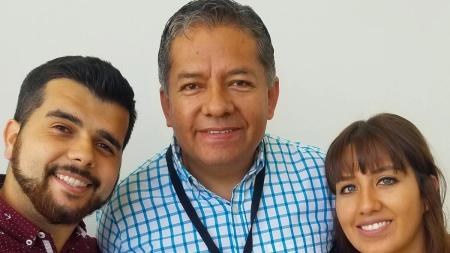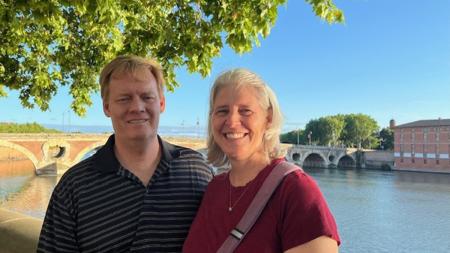Diet Eman Praised for Her Courage

Diet Eman before a visit to Grand Rapids by King Willem-Alexander of the Netherlands.
More than 300 people filled the sanctuary and the choir loft on Sunday afternoon, Sept. 8, for a service at Seymour Christian Reformed Church in Grand Rapids, Mich., memorializing the life of Diet Eman, a member of the Dutch resistance who found safe homes for dozens of men, women, and children fleeing the Nazis during World War II.
Eman died on Tuesday, Sept. 3, at the Samaritas Living Center in Grand Rapids. She was 99 years old.
“So many of us over so many years got to know Diet in so many ways,” said Mary Bouwma, a pastor at Seymour. “We are here today to mourn her death as someone we won’t see again. We also celebrate her voyage to be with her Lord and Savior . . . and that she will now be eternally with God.”
Eman’s deep faith, which she embraced early in life as she grew up in the Hague, the Netherlands, motivated her decision to join the resistance after the Nazis invaded the Netherlands in 1940. “The Holy Spirit worked in her life in numerous and wonderful ways,” said Bouwma.
Eman, who became a United States citizen in 2007, lived for many years in Grand Rapids, won several awards and honors for her work in the war, and helped write her own life story, Things We Couldn’t Say.
At the service, a number of friends spoke about Eman, sketching a picture of a woman of deep faith who had a good sense of humor and remained committed to helping others and seeking justice and mercy, first in the Netherlands, and then around the world until a few months before her death.
James Schaap, the author who helped Eman write her life story in 1994, recalled the first time they met. He had helped organize a conference at Dordt College in Sioux Center, Iowa, where he taught English, at which Holocaust survivors and others who had endured World War II were asked to tell their stories.
The goal of the conference was to share stories of the Holocaust and World War II with Dordt students, many of whom had parents who had lived through the war in the Netherlands and had helped in the resistance.
Schaap explained that when the first keynote speaker he had lined up for the conference couldn’t make it, a local chicken farmer suggested they ask Diet Eman to come instead. The farmer said he had met Diet Eman during a mission work trip and had learned some of her story.
“Although she had told her story only once before in a public setting, the farmer convinced her to come,” said Schaap.
When she spoke, telling the story of her work — and that of her fiance, Hein Sietsma — people in the room were spellbound. She was very animated and didn’t veer from describing the trauma of that time. She spoke of how she and Hein forged identification documents for people on the run and how they helped to harbor downed Allied pilots.
She spoke of Hein being captured and dying in a concentration camp and of how she was arrested and put in a camp — but was able to get out after convincing authorities she was a simple housemaid who wasn’t involved in hiding Jews. “It was a magnificent, incredible story,” said Schaap.
After she spoke, Eman and Schaap were standing together, and he asked if she had ever thought of writing her story. She had, and other writers had already asked, she said. So Schaap let it go at that, he said — until six months later, when she called him on a Sunday night. She had just returned from the evening worship service at Seymour.
“They had sung ‘Tell Your Children,’ a hymn out of the Psalter Hymnal in this very same church,” said Schaap at the memorial service. “Singing that, she had realized she wanted to make sure her children knew her story.”
In part, the hymn says: “Parents, tell your children, age to age the same. Glorify the living Lord above, magnify his holy name, magnify his holy name.”
Schaap then read a portion of Things We Couldn’t Say, in which Eman recounted going to the home of a well-respected Christian man and begging him to take in some people. When the man refused, Eman was furious, she said — but after the war she learned that he couldn’t tell her the truth: he was already harboring a Jewish family. “This is where the title for the book comes from. There were things you couldn’t say,” said Schaap.
Harlan Wilson also spoke during the service. He had been Eman’s supervisor for many years. He hired her to work as a translator at the appliance manufacturer Kelvinator Corp. in Grand Rapids.
“When I met her, I was still in the Marine reserve. I had served in Danang in Vietnam and knew she represented the greatest generation the world has ever seen,” said Wilson.
After the war, he said, Eman earned a nursing degree and moved to Argentina, where she worked for a decade as a nurse for the Shell Oil Company. She met and married her husband while she was in South America.
“They had two children and moved to New York,” said Wilson. “Their marriage hit troubled water, and she moved with her children to Grand Rapids. When I got to know Diet, she became part of our family.”
After she retired, Eman worked as a translator and volunteered for the Red Cross and the Luke Society. “She began traveling the world in her 70s, doing this work — and she did it well into her 90s,” said Wilson.
In the early 2000s, when a movement of people rose up claiming they didn’t believe in the Holocaust, Eman began speaking to groups regularly, first in West Michigan and then in many other places, about her experiences.
“When she spoke, it was a very emotional experience. The audiences were riveted and silent, whether it was in an elementary school or at an economics club,” said Wilson.
Over the years, Eman was recognized by many people for her work. But she never let it go to her head. President Dwight D. Eisenhower once wrote a letter thanking her for her wartime efforts.
Wilson said he found Eisenhower’s letter in one of her kitchen drawers and suggested she take it out and have it framed. “She did. She put it in her bathroom. We convinced her to at least hang it in the hallway.”
Yad Vashem, Israel's Holocaust museum, named her “Righteous among the Nations” for saving the lives of Jews during the Holocaust; and King Willem-Alexander of the Netherlands deemed her a “National Hero” during his visit to Grand Rapids in June 2015.
“Diet Eman was a loving and gentle hero whom we occasionally called the ‘second Mother Teresa.’ She will be missed,” said Wilson.
Mary Gray, Eman’s granddaughter, read Psalm 27, her grandmother’s favorite psalm, during the service. Part of it reads: “Though an army besiege me, my heart will not fear; though war break out against me, even then I will be confident.”
Brian White, a pastor at Seymour, gave a meditation on the psalm and on Eman’s life.
When he met Eman, said White, he “was shocked to discover that after her release from the concentration camp, she went right back into the resistance.”
But he was to learn that Eman was a woman of incalculable courage, who even at the age of 97 worked with children in the Dominican Republic and wanted to go back.
“In her diary, Diet asked why so many Christians did nothing when the Nazis invaded. What led those like Diet to act, to risk their lives for the sake of strangers?” asked White.
Almost to a person, “these were people who had a strong personal relationship with Jesus Christ,” said White, echoing an article he had read on the subject.
Besides having the kind of faith that gave her courage in the face of war, Eman was honest about herself. She could clearly see her own shortcomings, he said.
“She knew better than any of us her own brokenness, sorrow, and struggles — and yet she had a vision of God’s goodness, love, and grace,” said White.
“She recognized that no army, no struggle within ourselves or without can compare with God’s love. After a long life of service, God has called Diet to her true dwelling place.”
Eman also wrote for The Banner and shared her story in her later years. See what she wrote.


